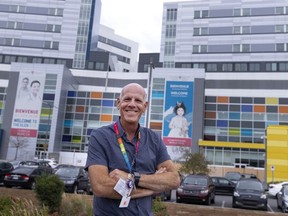There have now been nine confirmed cases in Montreal, including seven that are due to community transmission.

Article content
The measles outbreak in Montreal is at risk of spreading rapidly given how infectious the illness is and the city’s lower vaccination rates, an infectious disease expert warned on Thursday.
Quebec is the epicentre of the latest measles outbreak in Canada, with the bulk of transmission happening in Montreal. There have now been nine confirmed cases in the city, including seven due to community transmission.
Advertisement 2
Article content
Article content
“My concern is the numbers will exponentially explode,” said Dr. Earl Rubin, director of pediatric infectious diseases at the Montreal Children’s Hospital. “It’s not a hypothetical situation. I fear it is much more of a pending reality.”
At a news conference earlier this week, Quebec’s director of public health shared similar concerns as he detailed a drop-off in vaccine uptake through the years.
Dr. Luc Boileau noted that a 95-per-cent vaccination rate is needed for adequate protection, but said in some schools in the Montreal area as little as 30 per cent of children are vaccinated against measles.
Province-wide, roughly 98 per cent of students in high school and 86 per cent of elementary are students are immunized.
Yet vaccination rates are significantly lower in the Montreal, Laval and Montérégie regions, with Montreal’s overall rate at 82 per cent for high schools and 78.5 per cent for elementary schools.
As of Thursday, a total of 12 cases had been confirmed in Quebec. In addition to those in Montreal, there were two in Laval and one in the Mauricie region.
Article content
Advertisement 3
Article content
Measles was considered nearly eliminated from North America in the late 1990s and early 2000s, but several factors — including decreasing vaccination rates — have led to its resurgence.
In an interview Thursday, Rubin said an increase in immigration, international travel and vaccine hesitancy have all contributed to the issue. As did a discredited study linking the vaccine to autism, a theory often propped up by celebrities.
The illness all but being eliminated also played a role in people opting to no longer have their children vaccinated, Rubin added.
“Because people were not seeing measles, and would hear about maybe a complication from the vaccine — which is incredibly rare — they would tend to say they don’t need the vaccine,” Rubin said. “And that doesn’t hold if people are not vaccinated.”
Beyond the typical red spots, rash and fever, measles can cause severe complications in children and adults.
About one in five unvaccinated people in the U.S. who contracts measles ends up in a hospital, according to the U.S. Centers for Disease Control and Prevention. Up to three out of every 1,000 children who become infected die from respiratory and neurological complications.
Advertisement 4
Article content
“It is not a benign illness,” Rubin said, noting that it’s also one of the most contagious known infectious illnesses.
The virus spreads through the air or direct contact with an infected person. There’s a 90-per-cent risk of an unvaccinated person catching the disease if they’re around an infected person.
To date, Montreal public health authorities have identified 15 places where the virus could have been transmitted in recent weeks, including the emergency departments of the city’s two children’s hospitals.
In a letter sent to parents last week, Montreal public health director Mylène Drouin also noted there has been at least one case in a school. Drouin urged people who aren’t protected to get vaccinated as soon as possible.
Two doses of a measles vaccine after one year of age is almost 100 per cent effective at preventing the disease. The vaccine is also considered to offer protection for life.
In Quebec, people born before 1970 are considered adequately protected even if not vaccinated because they were probably exposed to the virus as children. People born after 1980 need both doses of the vaccine to be considered protected.
As for vaccine hesitancy, Rubin encouraged anyone with concerns to discuss them with their physicians.
“It’s a great vaccine,” he said. “Have a frank discussion with your health provider and let them address those concerns and whatever questions people may have.”
Recommended from Editorial
Advertisement 5
Article content
Article content






